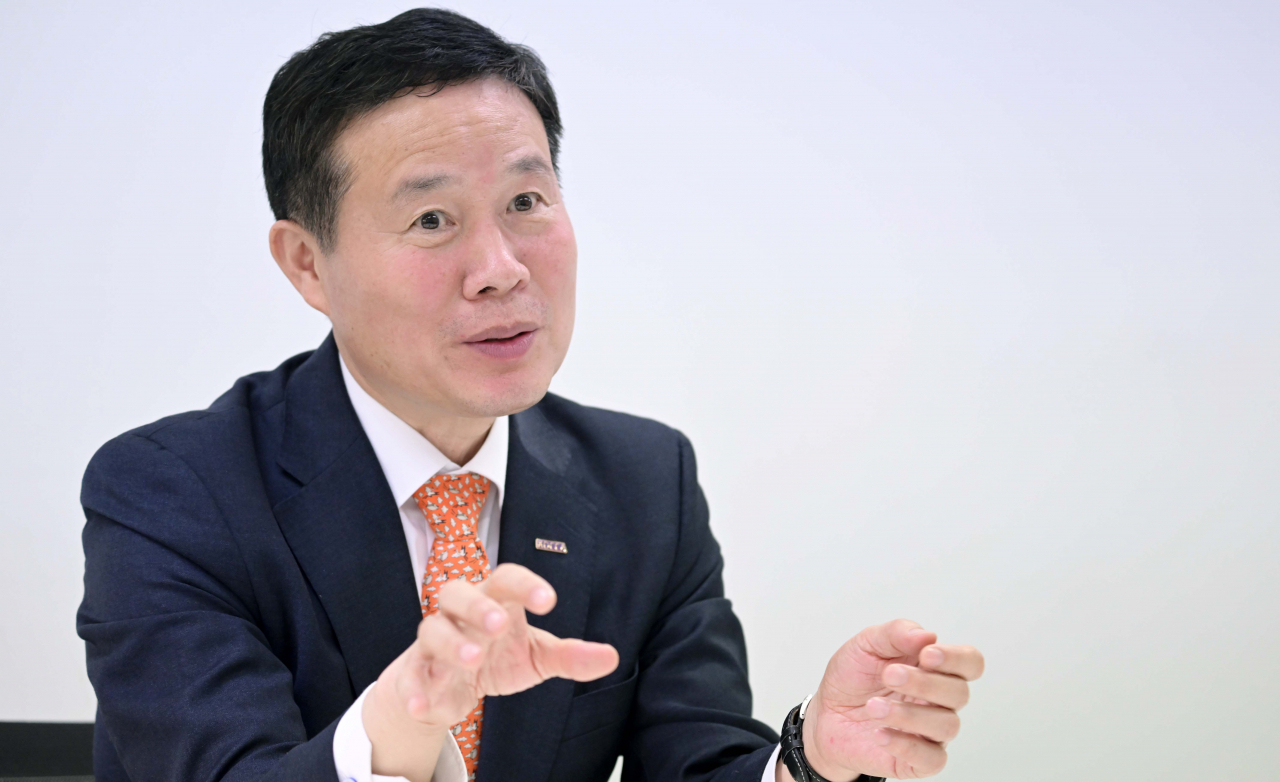 |
KOCCA President Jo Hyun-rae speaks with The Korea Herald at CKL Business Support Center in Jung-gu, central Seoul on March 22. (Lee Sang-sub/The Korea Herald) |
The Netflix original drama series "Squid Game" was the spark which changed everything.
While Jo Hyun-rae, president of the Korea Creative Content Agency, was confident about the power of Korean pop culture and recognized its potential when the KBS drama series "Winter Sonata" and its lead actor Bae Yong-joon achieved popularity in Asian markets outside of Korea in 2002, it was not too long ago that he began to feel Korea could play a more active role in the highly competitive global contents industry.
“There was K-pop, but ‘Squid Game’ was the real game changer,” Jo said in a recent interview with The Korea Herald.
The president explained that the local market and audience had been the prime target for content creators. While Korea sought to expand its popularity abroad, it was mainly focused on the Southeast Asian and Chinese markets. But, after Netflix's “Squid Game” became a global sensation, a number of aspiring directors have started to prioritize the global market.
“Ranging from broadcasting programs to related production companies, Korean creative content businesses are looking to the global market from the start. Even Korean startups, which KOCCA recently met, said that they are planning overseas business (activities) before (pursuing) local success,” Jo said.
As individuals or small and medium-size enterprises cannot achieve their dreams on their own, KOCCA takes on the role of providing creators an opportunity to compete in the global market with the necessary infrastructure and manpower.
“Not only creators, but agencies also need to have a similar perspective and understand foreign content markets to be able to provide effective assistance” the president continued.
Having served as the content policy director in the Ministry of Culture, Sports and Tourism from 2017 to 2019, the soft power expert felt that South Korean pop culture has certainly grown in prominence. But the KOCCA president believes that Korea’s creative content business lies at a crucial moment.
“Korean culture is receptive to new ideas. This aspect is reflected in our content business as well. Adapting to new technologies and creating unique stories based on our culture are what our creators have been doing in recent years,” he said.
“They caught the attention of global audiences, but the popularity and sustainability of Korean content remains in question if we dwell too much on the current success.”
Jo continued on to say that Korea is not the only important player in the global content market, adding that Korea will fall behind the international competition if the appropriate environment for unique, diverse and quality content is not adequately fostered.
“This is the reason why our content business lies at the time of (both) crisis and opportunity,” Jo told The Korea Herald.
“Netflix alone has a lot of content. I personally think that there are not many people who enjoy Korean originals simply because they are created by Korean directors and actors. They watch the programs because they are interesting and suits their taste,” he said.
“If Korea cannot meet these expectations, our pop culture craze will lose its momentum,” the president added.
Jo explained that cultural exchange may be a driving force to develop the country’s creative contents. He feels that an environment which encourages trial and error is necessary.
He expressed that while big companies may be less concerned about the shortcomings of such a system, a trial-and-error environment may place a huge financial burden on small- and medium-size enterprises. The content agency seeks to share this burden through various programs and policies.
“For example, if a 16-part local hit drama series is set to be promoted in a foreign country, we can offer language dubbing or translated subtitles. We can also broadcast Korean programs, but a localization process may be needed for different viewers. Making a comfortable environment to easily make such decisions is important,” Jo said.
“We have to find out what we can learn from those attempts and possible failures,” he added.
Jo shared that he can feel Korean content creators' desire to make headway into the global arena.
“It is KOCCA’s mission to become an effective channel between content-related stakeholders and the Culture Ministry. Finding the answer to satisfying the needs of creators and carrying out the government’s ambitions will be our biggest assignment,” the president said.






![[Today’s K-pop] Blackpink’s Jennie, Lisa invited to Coachella as solo acts](http://res.heraldm.com/phpwas/restmb_idxmake.php?idx=644&simg=/content/image/2024/11/21/20241121050099_0.jpg)
